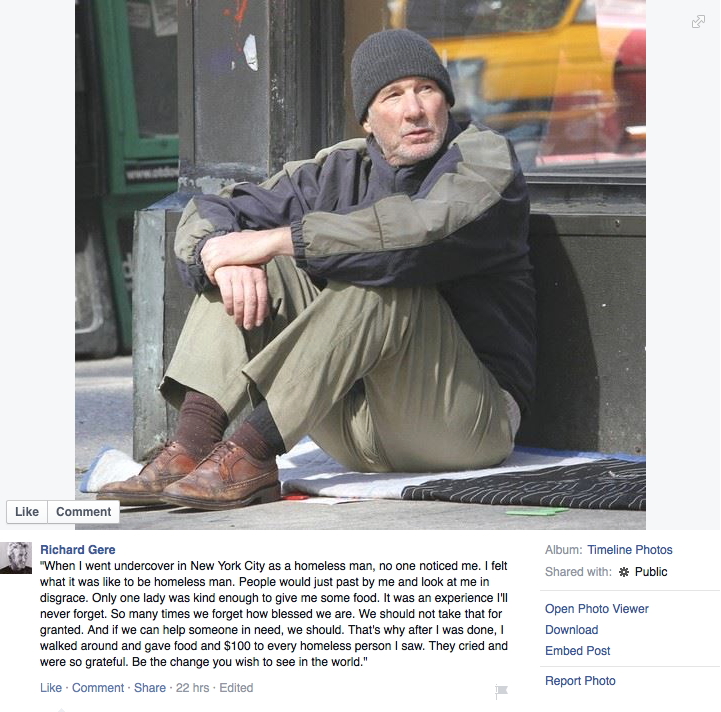Really, Richard Gere?
$100 Hand-Outs
Although the movie Time Out of Mind shows only one man’s narrative, it shines a very accurate light on the lives of many homeless people. Richard Gere was one of the driving forces behind making this movie.
He gets it.
Then, headlines began talking about Richard being so moved by the making of the movie that he walked around and gave the homeless people crisp, 100-dollar bills.

Bad move, Richard Gere!
This is quite possibly the most unhelpful move anyone could make in an attempt to aid homeless people. Why in the world would he do that after such a real experience?
Actually, he didn’t.
The good news is that Richard Gere didn’t completely fail the homeless people of New York by giving them loads of money. The post was a hoax by some imposter Richard Gere.
Let us tell you why this is a good thing, lest you win the lottery and do it yourself:
1. Homeless people don’t need more
Homeless people don’t need more money, food, lodging, or clothes – not really. The truth is, there are a ton of services out there (especially in Seattle – remember, we’re called “Free-attle” for a reason) providing these things. We don’t need more organizations hitting the streets with impersonal gifts that are already available.
Time Out of Mind shares a very revealing – and accurate – portrayal of what sometimes happens on the streets. George (Richard Gere’s character) begins the movie with a warm jacket. At some point, he goes to a pawn shop and pawns that jacket then uses the money to buy beer. Soon after, he is seen walking into a church and asking for a jacket – one that is promptly provided. He does this at least one other time in the course of the movie.
Please don’t take this to mean that all homeless people take advantage of the services provided to them. Not all of them do and some of them are very grateful for the services they receive. However, it is true that they generally can find material items relatively easily. They don’t need more.
2. Giving away free stuff to homeless people actually hurts our society
Why work? Why try? If everything is free, there’s no pressure to try to rise above the situation.
By giving away free stuff, we’re creating a culture of entitlement among homeless people. This doesn’t help us in the long run. All we’re doing is “fixing” an immediate need that only returns at the next mealtime. We’re constantly giving, yet the need is never quenched.
All the generosity in the world will not end homelessness. Free stuff for all is like digging a hole deeper and deeper and throwing the homeless people inside. It doesn’t help. We’re making them more and more helpless with every free gift.
3. $100 won’t help a homeless person on the streets of New York – or Seattle
Let’s face it. $100 would barely buy a hotel room overnight in New York City. It may feed you 3 meals per day for a week if you eat at McDonalds or another cheap fast food restaurant. It most definitely isn’t enough to rent an apartment. Though, it may buy two months of bus/train tickets…
One hundred dollars is a short term fix. It would help a homeless person survive for a few days.
Granted, a good night sleep and a shower could do wonders for a homeless person – but for how long? Eating for a week is great, but they can get food for free at shelters and “feeds.” Bus tickets are helpful, but where could they go that positively impacts their life?
Instead, what could Babysteps Ministry do with $100?
-
Feed over 50 people at a Relational Meal Event – focusing on building relationships and really seeing them and finding out who they are
-
Train up to 50 volunteers to engage in personal relationships with the homeless people they meet
-
10 one-on-one meetings with a homeless person – modeling success and empowering them to take a few steps forward
With $100, we could help homeless people thrive.
Don’t do what Richard Gere didn’t do
Would you consider donating $100 to Babysteps? Or, better yet – how about $10 per month? We’d love the opportunity to put that money to very good use helping homeless people thrive instead of just survive.

Upcoming Events
Take Your First Step -
REACH OUT TO US
Questions about our program? Want to join us and serve a meal? Interested to spend a day getting to know a homeless person? Reach out and someone from our staff will get back to you within 48 hours.
© Copyright 2021 Baby Steps Ministry
Taking Baby Steps Toward Transformation

Leave a Reply